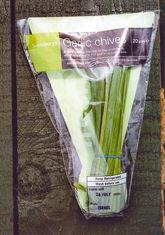
It will therefore be interesting to see how the new Cape offering I spotted in Sainsbury's performs (see FPJ p6 July 25). If it works, the possible combinations are endless. The only aspect which might hold back sales is that customers can select their own choice as a high proportion of apples are sold loose. So it may be a question of whether convenience counts.
While in the same store I came across what can only be described as a mini kebab/barbecue vegetable pack at £1.49. The idea is not new, as Marks & Spencer had a giant version on its shelves in the spring. But both products are sourced from Kenya. What it does reflect, however is that customers will pay for a combination of products and for novelty, as well as for ridding themselves of the chore of threading at least 10 vegetable chunks onto a wooden skewer.
This brings me nicely onto herbs, which feature as a regular part of many semi-prepared packs. Garlic chives (88p) are something new to me, so I wonder if there will be a whole new wave of products coming forward in the years ahead and that we might soon be able to buy mint with a taste of parsley, or coriander which has a flavour akin to basil?
Still on the vegetable front I was intrigued to see that Tesco is now labelling its loose onions with, in effect, a cooking recommendation. My single bulb to create a photo opportunity cost 58p. The industry has certainly moved on from simply classifying onions as mild or for cooking, which makes the proven Supasweet categorisation (see p6) even more pertinent. This is particularly relevant as the Tesco curry onion is a white variety: one that most customers might normally consider mild.
Switching to fruit, it seems that one way of finding a winner is to reach a point in retailing where multiples can claim exclusivity. As the European grape season gets under way, Marks & Spencer has Ebony from Spain on its shelves at £2.49 for 400g. The fact that it is seedless underlines the fact that seeded grapes are almost becoming a thing of the past, with seedless fruit preferred because of its convenience and appeal to children.
Pester power is a relatively modern marketing term, and how wonderful it would be for consumption if children really took an interest in the fruit they eat. Waitrose must have had this in mind with the growth of its Food Explorers sub-brand designed to do just what it says on the label. Apart from added interest as far as bananas are concerned (99p), it adds a further product to the range, and of course is a good way to sell small fruit.






No comments yet